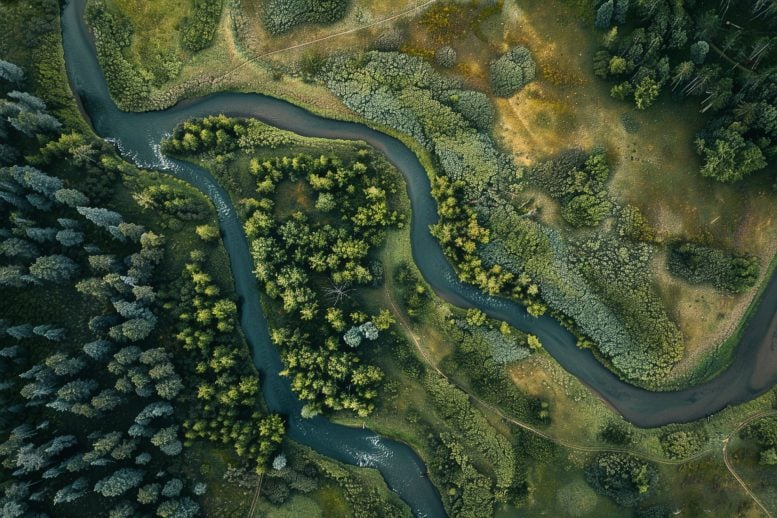Global Warming Causing Disruption to River Systems: Urgent Climate Concern

Climate change is significantly affecting the natural seasonal flow of rivers in northern regions. This poses considerable threats to ecosystems and water security. The primary cause for this has been identified as human-induced climate change. Source: SciTechDaily.com
Recent studies indicate that climate change is actively changing the seasonal flow of rivers in northern parts of America, Russia and Europe, thereby increasing risks to ecosystems and water security.
Historical data from various river gauging stations worldwide was analyzed by a group of scientists headed by the University of Leeds. They discovered that 21% of these stations exhibited significant changes in the seasonal rise and fall in water levels.
Based on data-driven reconstructions and state-of-the-art simulations, the research revealed that seasonal alterations in river flow are less likely to occur in latitudes above 50°N than before. This alarming change can be directly linked to the changes in climate caused by human activity.
Prior to this research, the impact of climate change on seasonal river flow was relatively unknown, as previously existing evidence was largely limited to localized studies or those not properly accounting for human impacts.
The team used monthly average river flow measurements from 10,120 gauging stations for their research, spanning from 1965 to 2014.
This was the first study that successfully managed to exclude direct human interventions like reservoir management or water extraction, demonstrating that the reduced seasonality in river flow was largely driven by climate change.
The results of the research funded by the University of Leeds and the Southern University of Science and Technology in China was recently published in Science journal.
Hong Wang, the lead author of the study and a PhD researcher at the University of Leeds and the Southern University of Science and Technology, said, “Our research demonstrates that the natural patterns of river flow are undergoing significant changes due to rising air temperatures.
Fundamentally, what is disturbing about this change is the noticed weakening of the river flow seasonality. This is a direct result of historical human-induced emissions. If the air temperatures continue to rise, the river flow seasonality will experience a steady and substantial decrease.”
Both directly and indirectly, human activities are impacting river flow patterns all over the world. Direct impacts include flow regulations like reservoirs, and indirect impacts result from land use change and climate change's effects on air temperature, precipitation, soil moisture, and snowmelt.
Excluding the indirect impacts of increased greenhouse gases and aerosols, over two-thirds of the world’s rivers have already experienced alterations due to human activities.
River flow seasonality plays a crucial role in the cyclic pattern of floods and droughts. An unsettling of these peaks and troughs could threaten water security and freshwater biodiversity.
The researchers discovered a significant decrease in river flow seasonality in 40% of the 119 stations observed in northern North America. South Siberia exhibited a similar trend with 32% of stations reporting a significant decrease.
In Europe, a similar pattern was observed with 19% of the river gauging stations experiencing a significant decrease predominantly in northern Europe, western Russia, and the European Alps.
The contiguous United States, excluding rivers in the Rocky Mountains and Florida, displayed an overall decreasing trend in river flow seasonality.
In central North America, notable decreasing trends in river flow seasonality were observed in 18% of the stations.
Interestingly, in southeast Brazil the researchers found an increase in river flow seasonality in 25% of the gauging stations. This clearly indicates that changes in the water cycle have varying impacts globally.
Dr. Megan Klaar of the University of Leeds School of Geography, who co-authored the research, stated, “The varying highs and lows of river flow across different seasons offer essential cues for the species residing in the water.
For instance, certain fish species use noticeable increases in water as an indication to migrate to their upstream breeding areas or towards the sea. If these cues vanish, the fish may not be able to spawn successfully.”
The research concludes that there is a need to accelerate climate adaptation efforts to safeguard freshwater ecosystems by managing flows to try to recreate some of the natural systems and processes that are being lost.
Professor Joseph Holden, the Director of water@leeds and who supervised Hong Wang’s research, added: “A lot of concern is based upon what climate change will do in the future but our research signals that it’s happening now and that increases in air temperature are driving huge changes in river flow.
“We should be very concerned about what the future holds given accelerating climate change and begin to think about mitigation strategies and adaptation planning to alleviate the future weakening of seasonal river flow, particularly in locations such as western Russia, Scandinavia, and Canada.”
Reference: “Anthropogenic climate change has influenced global river flow seasonality” by Hong Wang, Junguo Liu, Megan Klaar, Aifang Chen, Lukas Gudmundsson and Joseph Holden, 29 February 2024, Science. DOI: 10.1126/science.adi9501




